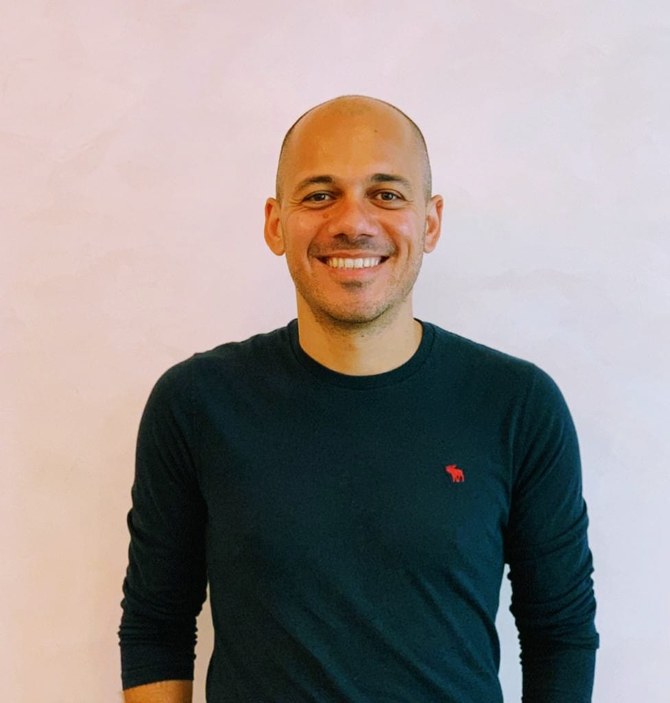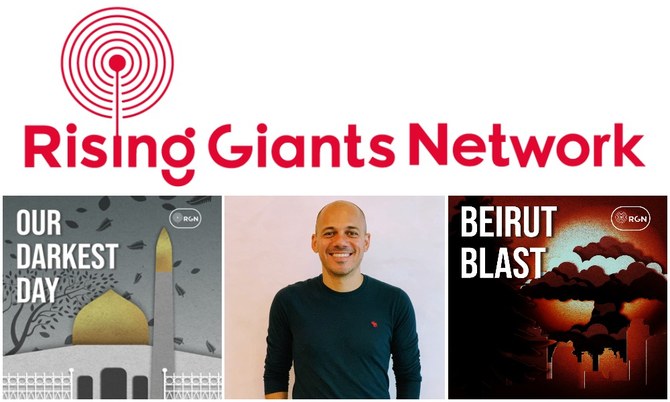DUBAI: From advising clients at creative agency TBWA\RAAD to managing content programming at Red Bull, Basel Anabtawi is no stranger to storytelling.
Bored of listening to music while out running, Anabtawi started discovering podcasts, which inspired him to create his own show “Basel Meets” in 2017.
Stumbling upon immersive shows such as “The New York Times,” “Serial,” and Wondery’s “Legal Wars,” made him consider why nothing similar existed in Arabic.
So, along with Bashar Najjar, he co-founded Rising Giants Network (RGN) with the aim of bringing immersive storytelling to regional podcasts, especially in the Arabic language.
The duo partnered with Barry Kirsch Productions (BKP), which provides RGN with studios for recording, and soon after released their first podcast – Anabtawi’s personal favorite – “Legendary Rock Stories.”
Arab News spoke to Anabtawi to learn more about his journey into podcasting and the future of immersive podcasts.
Could you provide some background on what inspired you to leave Red Bull and start Rising Giants Network?
I started my own show “Basel Meets” in 2017 and I dropped everything and just focused on the show. It started growing; it was one of the first podcasts from the region and I started getting more guests on the show.
Then, I started listening to podcasts such as Wondery’s shows in the US, which were more narrative-driven. That really took me on this immersive experience, and I wished we could have stuff like that in Arabic, so that’s where the seeds started.
Leaving Red Bull, where I headed content programming for the Middle East and Africa region and starting RGN was a big gamble for me; everybody talks about video and here I am coming and talking about audio.
But, at that point, I knew that we had an investor locked in and so I spoke to my wife, and she said, ‘if not now, then when?’ It was very hard for me to leave Red Bull – even kind of dumb – but I just felt if not now, then when? So, I bit the bullet, as did my partner Bashar Najjar, who is the co-founder and sound engineer of RGN.
Thankfully, we had a few rounds of investments, and the value of our total investment was $1 million by January of 2021. We now have 15 shows, and we are going to close the year with about 20 to 22 shows. We’re not sharing numbers yet, but I can say that we’re going to reach our milestone way sooner than we thought we would.
RGN launched in July 2020 in the middle of the coronavirus disease (COVID-19) pandemic. How did the lockdowns affect the production of shows and the launch?
We had to convince other podcasters to be a part of our journey, so we started reaching out to media personalities, voice-over artists … people who just had a passion for something but didn’t know how to start a podcast.
We had these people lined up and then the lockdown started. Bashar was stuck in Saudi Arabia for a full year because he was opening BKP’s Saudi studio. We were wondering how we could build a company when everyone was stuck at home or stuck in a different country, and we just did it.
We sent them (hosts) microphones and when there was a partial reopening, we sent people to the studio to record. We then sent the files to Bashar in Saudi and worked on everything remotely.
Our partner, Said Al-Sayyed, who was handling the incorporation of the company, made sure the first seed money went into the company. So, lo and behold, we built the website, had five shows produced remotely in the lockdowns, and we launched on July 7, 2020.
What is the process for creating an original show from selecting the host, to production, and distribution?
We have a process called Sonic Play. We vet everything through this process that has filters such as audience, narrative, and benchmark. If an idea passes this stage, we work on figuring out the right host and working on the script.
After that, we work on the technical aspect such as programming, equipment, et cetera, and finally the distribution network.
Despite the focus on the Arabic language, RGN produces shows in English as well. Do you intend to produce bilingual shows and what’s the strategy for deciding the language of the show?
Our focus is definitely Arabic; 90 percent of our shows are in Arabic. When we find shows that we feel could really compete on a global scale, we’ll do them in English. Moreover, there is an English-speaking market as well in this region and we don’t want to neglect that either.
For example, we knew there was a global angle to the show “Our Darkest Day,” and we had an incredible journalist Ashleigh Stewart hosting it, so we want to do these types of shows as bilingual because the story is so strong.
Similarly, with “Beirut Blast,” which was launched on Aug. 4, we did it in English and Arabic. We wanted the hosts to be from Lebanon and we found a local journalist (Nada Itani) as well as an English Lebanese journalist (Linda Tamim).
We would love to do other languages too, such as French, Turkish, and Spanish but only if the story is strong enough. Overall, though, RGN’s focus is the Arabic language because that is where the biggest gap is.
Speaking of the Arabic language, there are so many different dialects in the region. How do you decide which dialect you’re going to record in?
It depends on two factors: The podcaster and the story. If the podcaster were from a particular country, we would let them use their own dialect because we’re supporting them as a talent, and we want them to be themselves.
When it comes to a scripted story, we look at which market we are targeting. If the story has a Saudi-first audience, we will try to find a Saudi host. There will always be a bleed from other countries; 60 percent of our listeners are from Saudi, and the remaining 40 percent are a mix of other countries in the region, but the UAE, Lebanon, and Egypt are all big markets for us.
At the end of the day, we want to respect our audience and cater to them, so we’re constantly testing and learning.
What can we next look forward to from RGN?
We have partnered with the Saudi Arabian Grand Prix race. We’re also starting to monetize our shows and we have done an original podcast exclusively with (music streaming service) Deezer.
We are also launching on Apple Podcast Subscriptions (paid version) with an exclusive show called “Behind the Blood,” which is a scripted show about the mafia.





























